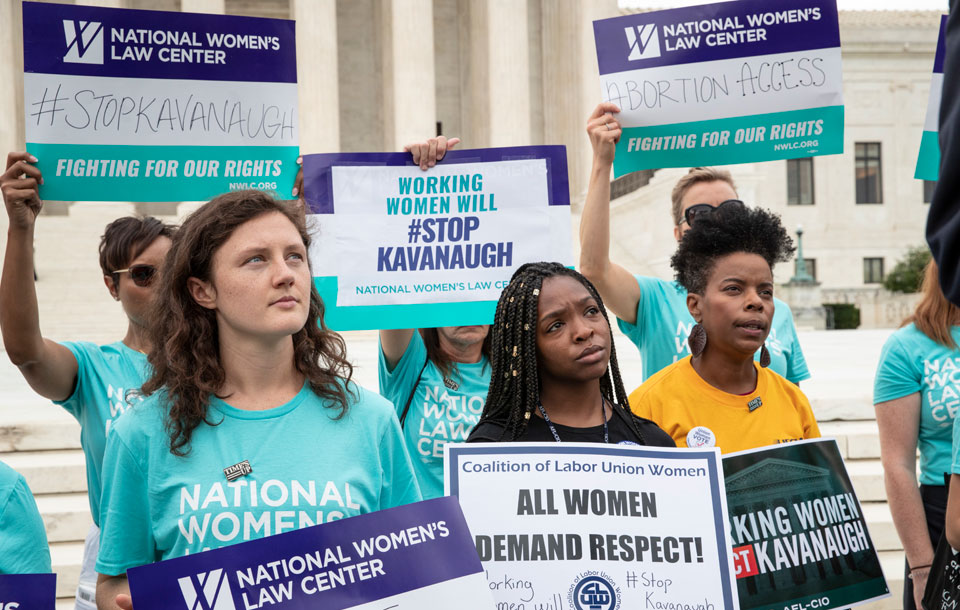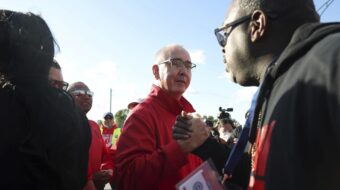
Working women and union members took to the streets August 22 to show widespread opposition to President Donald Trump’s pick for a vacant U.S. Supreme Court seat, federal appellate judge Brett Kavanaugh.
And thousands of more people, lined up by other groups—including the Working Families Party—will continue the protests on August 26.
The point of the demonstrations is to convince senators to vote Kavanaugh down, citing his anti-worker decisions and dissents in 12 years on the U.S. Circuit Court of Appeals for D.C. Hearings on his nomination are scheduled to start September 4.
But Kavanaugh’s prior record as a GOP political hack in the George W. Bush 2000 election campaign and in Bush’s White House, as well as his record in the politically-motivated impeachment of Democratic President Bill Clinton over Clinton’s affair with then-intern Monica Lewinsky, also cause concern.
So does Kavanaugh’s statement saying a president should not be subject to criminal trials or even testimony while in office. That could apply to Trump.
“Working women are rising up and speaking out against the nomination of Brett Kavanaugh to the Supreme Court,” said the Coalition of Labor Union Women, which led the August 22 demonstration in front of the High Court.
“Time and again, Kavanaugh has ruled against working people, especially those pursuing employment discrimination claims and trying to join together in a union. So much is on the line with Kavanaugh’s nomination, including our ability to hold our harassers accountable, to achieve equal pay, to fight pregnancy discrimination, and to organize for our rights at work. We can’t let Kavanaugh have a lifetime seat on the highest court.”
The groups with CLUW on August 22, included the Communications Workers, the National Women’s Law Center, AFSCME, the Asian-Pacific American Labor Alliance, the Service Employees, and the AFL-CIO.
They all “demand the Senate side with working women,” CLUW said. And they provided sample tweets to send to senators, including the hashtag, #StopKavanaugh.
“Kavanaugh has a long record of routinely ruling against workers and their families and regularly siding with employers against employees seeking justice in the workplace—including CWA members,” the union said before the rally. “Kavanaugh’s track record also shows hostility to government protections for workers, consumers, women, and fundamental civil rights.”
CLUW and its allies’ rally was not the only anti-Kavanaugh activity as Labor Day approached. Both the American Federation of Teachers and the National Education Association posted urgent alerts on their websites telling members to contact their senators against Kavanaugh. AFT urged its 1.7 million members to use personal stories to illustrate how Kavanaugh on the court would hurt them.
“Can’t make it this weekend?” Sara Ackerman of the Working Families Party, whose group is co-sponsoring the August 26 national rallies, asked. “Call your senators today and tell them to postpone the hearings and reject Kavanaugh.
“This isn’t only about Trump hand-picking a Supreme Court justice who could decide his personal fate. If we don’t stop Kavanaugh’s nomination, then Roe v. Wade, voting rights, workers’ rights, LGBTQ rights, immigrant rights, and so much more will be in grave danger, and the Supreme Court will shift to the right for a generation,” she said.
Trump and Senate Majority Leader Mitch McConnell, R-Ky., plan to begin the Kavanaugh hearings on September 4. Both want him on the bench before the fall election. If confirmed, Kavanaugh would replace Justice Anthony Kennedy, who retired, and enlarge the court’s right wing. Kennedy was often the court’s “swing justice.”
Both sides are focusing on six senators: Democrats Heidi Heitkamp (N.D.), Claire McCaskill (Mo.), Joe Manchin (W. Va.), and Joe Donnelly (Ind.) and Republicans Lisa Murkowski (Alaska) and Susan Collins (Maine).
Trump easily carried the Dems’ states and all are running for re-election. Murkowski and Collins say they’re pro-reproductive rights, while CLUW and its allies point to evidence showing Kavanaugh isn’t.
The other 43 Democrats and both independents are counted as anti-Kavanaugh. An hilarious tweet from Sen. Mazie Hirono, D-Hawaii, on August 23, shows their position.
“I have cancelled my meeting with Judge Kavanaugh. @realDonaldTrump, who is an unindicted co-conspirator in a criminal matter, does not deserve the courtesy of a meeting with his nominee—purposely selected to protect, as we say in Hawaii, his own okole,” she said.
All other 48 Republicans—Arizona’s John McCain is absent—are assumed to be pro-Kavanaugh.












Comments